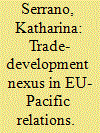|
|
|
Sort Order |
|
|
|
Items / Page
|
|
|
|
|
|
|
| Srl | Item |
| 1 |
ID:
140486


|
|
|
|
|
| Summary/Abstract |
The Pacific Islands region might be regarded as one of the most remote and politically least significant areas in the geopolitical and economic considerations of world giants. However, as the regional order of the Asia–Pacific changes rapidly, China has shown more eagerness to engage the island states. Interestingly, Beijing's former arch-rival Taipei still maintains, arguably, considerable influence over the region. This raises a question that is thought-provoking: why is this status quo tolerated by Beijing? Drawing on empirical sources in relation to communication between Beijing, Taipei and these island states, by focusing on how Beijing handles the South Pacific region in general and the six non-recognizing states in particular, this article attempts to tackle the question by distinguishing the difference in Beijing's mentality today from that of 30 or 40 years ago. It argues that the zero-sum mentality of fighting against Taipei in the region has now been replaced by a positive-sum assumption to engage Taipei, as well as the pan-Chinese community in the world, via the PIS, regardless of whether they establish formal ties with Beijing or not.
|
|
|
|
|
|
|
|
|
|
|
|
|
|
|
|
| 2 |
ID:
101833


|
|
|
|
|
| Publication |
2011.
|
| Summary/Abstract |
For almost 40 years, relations between the European Union and African, Caribbean and Pacific (ACP) countries centred on trade and development policy. The partnership survived various challenges and evolved into an institutionalised model for North-South relations. In reaction to internal and external forces of change, in the Cotonou Agreement (2000) the EU introduced to its relations with the developing world a new trade-development paradigm to be implemented via Economic Partnership Agreements. The latter are intended to be innovative foreign policy instruments, functioning as development tools and trade liberalisation mechanisms. Against the background of current internal restructuring of EU foreign policy and an increasingly politicised development agenda, this article undertakes an enquiry into the nature of the trade-development nexus in EU-Pacific Island countries (PICs) relations. The analysis is based on a theoretical framework which employs assumptions and findings related to IR theory, referring in particular to realism and dependency theory. A critical examination of EU policies shaping the trade-development nexus reveals that it is a rather flexible foreign policy tool, equipped with an auto-adjustment mechanism to ensure the balance of EU trade and development objectives. From PICs' perspective, its predictability and therefore developmental value, may, however, be diminished.
|
|
|
|
|
|
|
|
|
|
|
|
|
|
|
|
|
|
|
|
|